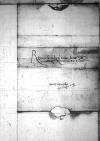List #5717
Sigismund I Jagiellon do Ioannes DANTISCUSCracow (Kraków), 1544-12-04
| odebrano Heilsberg (Lidzbark), 1544-12-17 Rękopiśmienne podstawy źródłowe:
| ||||||||
Tekst + aparat krytyczny + komentarz Zwykły tekst Tekst + komentarz Tekst + aparat krytyczny
Reverendo in Christo Patri, domino
Reverende in Christo Pater et Domine, sincere nobis dilecte.
Gratum nobis fuit ex litteris Paternitatis Vestrae cognoscere, quod maiores quoque civitates
Et bene valeat Paternitas Vestra.
Dat(ae) or Dat(um)⌈Dat(ae)Dat(ae) or Dat(um)⌉
Ex commissione sacrae regiae maiestatis propria


 BNW, BOZ, 953, f. 246v
BNW, BOZ, 953, f. 246v